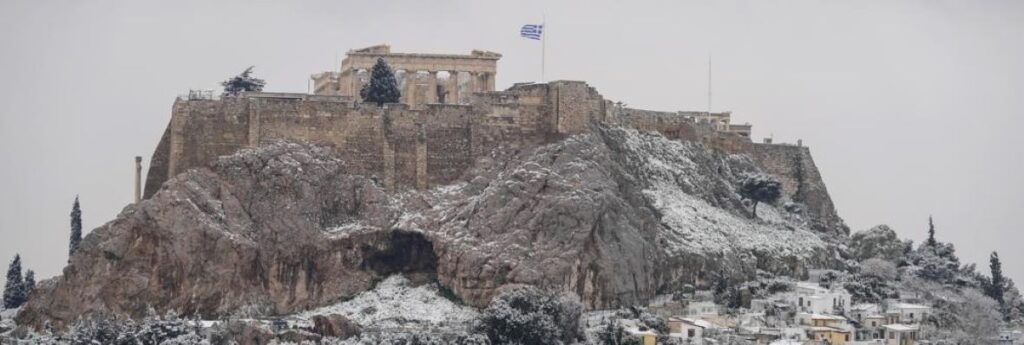Heavy snowfall disrupted air traffic Monday in Athens and Istanbul, while several Aegean islands and much of Turkey were blanketed by snow. The storm, named Elpida, or “hope” in Greece, snarled traffic in both the Greek capital and the neighbouring Turkish metropolis of 16 million people.
Flights in and out of Istanbul Airport were suspended until 4 a.m. Tuesday while authorities worked to clear runways as well as a road leading to the airport. Meanwhile, public offices closed early to ease rush-hour congestion.
Flurries were forecast to continue over the next few days in Istanbul. Istanbul’s Disaster Coordination Center AKOM says an Icelandic low-pressure system is behind the cold front and precipitation.
In Greece, authorities warned the public to limit outdoor movements to only essential ones on Monday and Tuesday, while schools in many areas were closed. Government spokesman Giannis Oikonomou said more than 46,000 school classes across the country were being held online.
The snow was coming down thick and fast throughout the day in central Athens, settling on the marble columns of the ancient Acropolis. Authorities sent out emergency alerts to cell phones in the wider Athens area warning of severe snowfall.
Snow chains were mandatory for cars on many roads, while trucks were banned from the main highway heading north from Athens. Nevertheless, the icy conditions and lack of snow chains on some vehicles left traffic snarled for hours on many of the Greek capital’s roads, including a highway ring road and one of the main avenues in Athens.
Several domestic and international flights to Athens airport were cancelled, while subway service to the airport was partially suspended as some of it runs above ground.
The health ministry announced that COVID-19 vaccination centres in the wider Athens region of Attica and on the nearby island of Evia would close at 3 p.m. Monday and would remain closed on Tuesday because of the heavy snowfall.
Oikonomou said weather conditions would continue to be “difficult” on Tuesday. Civil protection authorities have set up coordination centres with the fire department, police, the armed forces and local authorities to tackle any problems, he said.
Snow is common in the Greek mountains and in northern Greece but is less frequent in central Athens and on Aegean islands. Last year, the Greek capital was hit by a major snowstorm that caused severe problems, knocking out power for days in certain neighbourhoods and making all streets impassable without snow chains. Thousands of trees collapsed from the weight of the snow and ice.
To the north in neighbouring Albania on Monday, all elementary and high schools closed for three days because of cold weather. Authorities advised people to avoid driving. Temperatures reached -17 C (about 1 F) in eastern Albania, isolating some areas and causing problems for the electricity and water supplies. Many rural roads have been blocked.

